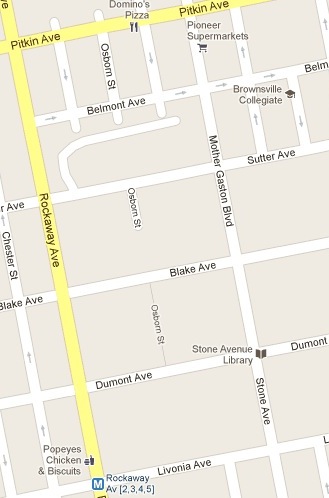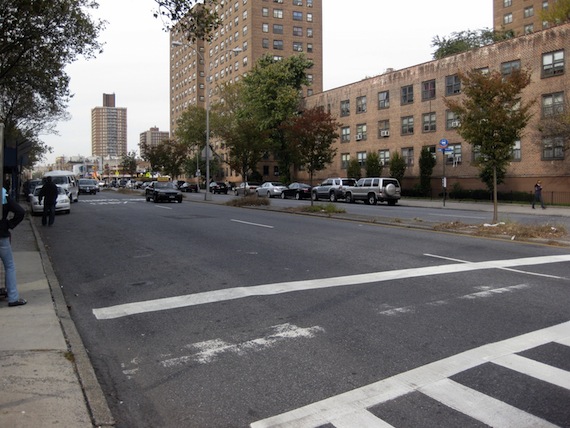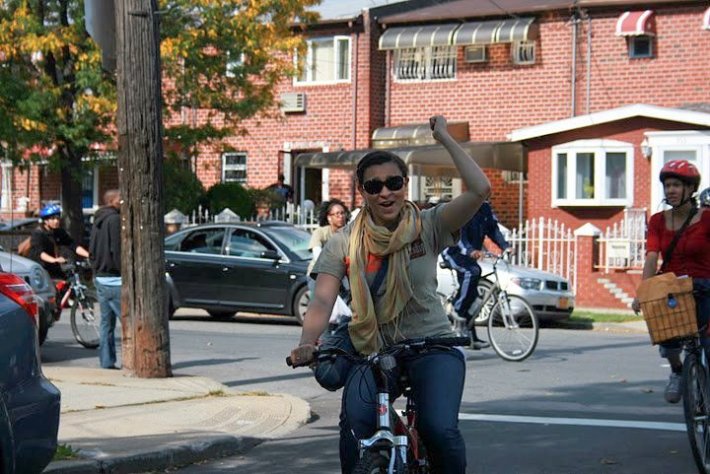Brownsville wants safer streets for biking.
Currently there isn't a single bike lane inside this eastern Brooklyn neighborhood, though two bike lanes run along the edges of Brownsville on East New York Avenue and Rockaway Parkway. Neighborhood activists, including the business community, senior citizens and public health advocates, are now organizing to convince the city to install both north-south and east-west routes through the area.
The push for bike lanes originated from Bettie Kollock-Wallace, the first vice president of Brooklyn Community Board 16. "My philosophy is the more active you are the younger you get," she told Streetsblog.
Last summer, the 72-year-old Kollock-Wallace was leading Brownsville seniors on group rides in Prospect Park. Without a strong network of bike lanes, however, she found it difficult to get there, especially with inexperienced cyclists trailing behind her. "If we had the bike lane you could easily follow the route," said Kollock-Wallace. "You could be safe." She identified Mother Gaston Boulevard as the preferable location for a lane connecting to the existing bike network.
Three weeks ago, the Department of Transportation came out to Brownsville for a group ride co-hosted by the Brownsville Partnership, an initiative of the non-profit Community Solutions, and the Brooklyn District Public Health Office, a local arm of the NYC Department of Health. Scouting an eight-mile loop of the area, they discussed street conditions and obstacles to safe cycling. A spokesperson for DOT said the department is in the process of identifying bike routes that could be implemented in the future.

Community leaders are pushing for bike lanes on a few streets in particular, including Mother Gaston. Corinne LeTourneau, the director of special projects for Community Solutions and a leader in the Brownsville Partnership, said that with two traffic lanes and a parking lane in each direction, there's lots of room on Mother Gaston for a bike lane. The street also bisects two NYCHA superblocks. With no retail facing the street on either side, the street tends to have much lower foot traffic than surrounding blocks. LeTourneau hopes that a bike lane could put some more eyes on the street.
LeTourneau also wonders whether it would be possible to allow bikes to ride along the paths that used to be part of Osborn Street before the street was interrupted by a series of superblocks. The Brownsville Partnership is interested in restoring the street grid through the neighborhood. In the short term, allowing bikes on the path might make it more street-like, or at least make it easier to get around. Right now, the Brownsville Partnership has used banners and chalk to mark Osborn as a continuous north-south path.
Daniel Murphy, the executive director of the Pitkin Avenue business improvement district, is also organizing to get a bike lane through the neighborhood. Pitkin begins where Eastern Parkway hooks north and its greenway ends. Murphy imagines a painted bike lane continuing eastward from there. "Pitkin is just an ideal place for a bike lane," he said.
He says history is on his side. "Zion Triangle, which is going to be turned into a public plaza, was in its original scoping document going back to 1896 identified as an ideal place for bicyclists to rest on their way from Brooklyn to Queens," said Murphy. He plans to work with local bike shops to build an East Brooklyn Bike Club and from there, head to the community board.
The demand for bike lanes among Brownsville residents is clear. Alphonso Stewart, a stunt rider who's set his sights on competing in the X Games, also helps lead bike rides for Brownsville residents. "Biking is one of the best ways to keep your body healthy," he said. "It should be the number one exercise for anybody and everybody."

Though he feels comfortable enough to bike to neighborhood parks, where he practices his tricks, Stewart said that the unsafe streets hold a lot of people back. "If you ride on the sidewalk, you get a ticket and could hurt somebody or a child," said Stewart. "If you ride in the street, you could get hit by a car." Faced with that choice, said Stewart, many choose the sidewalk, feeling that the cost of a ticket is still preferable to being hit by a car.
Grandmother Karrie Scarboro went on her first group ride three weeks ago. Though she hadn't been on a bike since she was 13 years old, she said it was great and would go back out with her grandchildren. "We need bike lanes, definitely bike lanes," when asked what she observed on her ride. "We have a lot of young teens riding, young kids. A lot of cars weren't so friendly."
A fourth-grader named Dynasty has joined each of the weekly rides. "It's fun. We go to lot of places," he said. He feels completely safe in the large group but wouldn't ride on his own. "It would be a lot of cars," he said, "and they won't know to stay far away."






